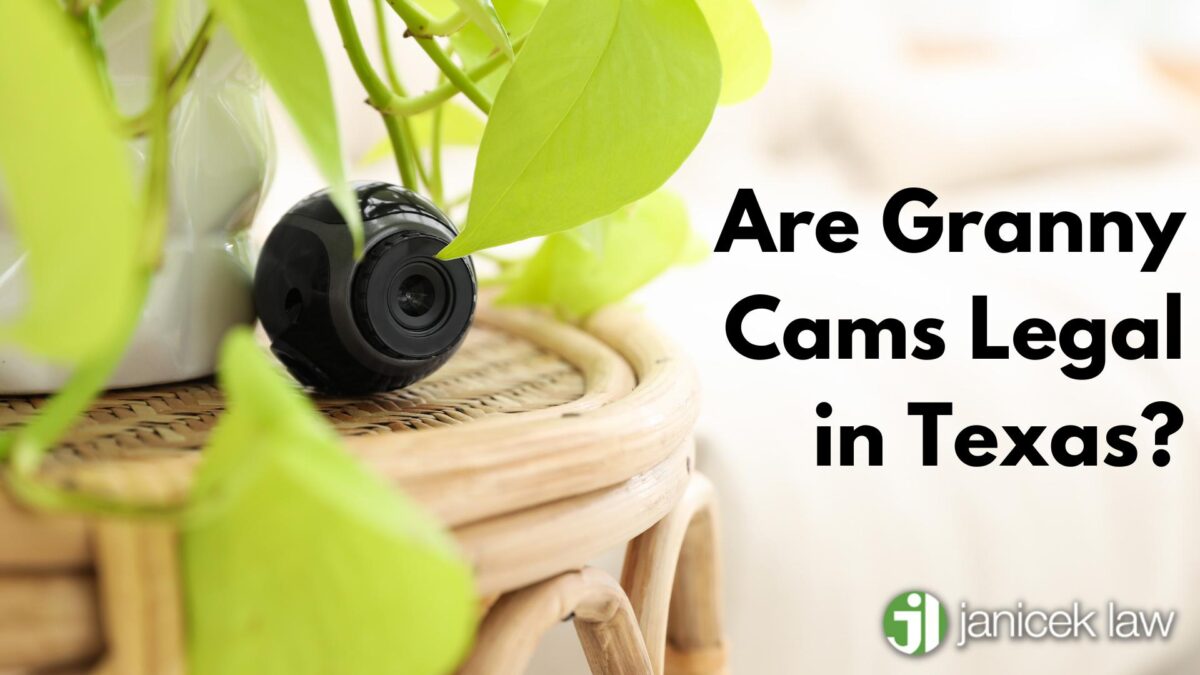Deciding to move a family member into a nursing home can be difficult. You can’t be with them daily and ensure they’re being cared for. This is why some families install surveillance cameras in their loved one’s rooms at the nursing home. Whether you suspect that your loved one is being abused or you simply want to ensure they’re taking their medication, Texas laws permit the installation of surveillance cameras in nursing home rooms.
However, granny cams are a legal gray area, so if you’re considering installing one in your family member’s room, you must be familiar with the laws surrounding this type of surveillance. If you suspect nursing home abuse or neglect and want to install a camera, discuss your options with a San Antonio, TX, nursing home abuse attorney at Janicek Law. Installing a camera in your loved one’s room can make them feel like you’re invading their privacy and should be used as a last resort. Our attorneys will explain the laws in Texas surrounding granny cams and what you should do if you suspect abuse or neglect. To schedule a free consultation at Janicek Law, call 210-366-4949 today.
What is a Granny Cam?
Family members of a nursing home resident can install granny cams to monitor them and catch any nursing home abuse that may occur. A granny cam is similar to a nanny cam, but it’s placed in plain sight.

Can Families Put Cameras in Nursing Home Rooms?
Yes, in Texas, families can put cameras in a loved one’s nursing home room.
There are several reasons that family members may decide to install security cameras in their loved one’s room at a nursing home.
- They believe that the nursing home staff is abusing their loved ones. This abuse can include physical abuse, psychological abuse, verbal abuse, sexual abuse, etc.
- They believe that a fellow resident is abusing their loved one.
- They want to ensure their loved one eats regular meals and takes medications.
- They want to ensure that the nursing home staff is helping their loved one with hygiene, like bathing, brushing their teeth, and helping them move around. If they need anything, they want to ensure that the staff is assisting or providing it.
Which States Allow Cameras in Nursing Homes?
Since no federal laws prohibit granny cams in nursing homes, each state has the freedom to decide whether or not they will allow nursing home cameras. Texas is one of several states that allows family members to install a security camera in their loved one’s room. Listed below are the other states that allow nursing home surveillance cameras.
- Illinois
- Louisiana
- Connecticut
- New Jersey
- New Mexico
- Maryland
- Kansas
- Missouri
- Utah
- Oklahoma
- Virginia
- Washington
- Wisconsin
- Ohio
- Minnesota
The laws surrounding granny cams vary from state to state. If you’re considering installing a hidden camera in your loved one’s room at their nursing home, it’s important to know your state’s laws. Many states allow nursing home cameras as long as they’re in plain sight and do not record audio. Some states require notifying the nursing home administrators before you install the camera. So make sure you look up your particular state’s laws regarding nursing home cameras before you purchase your surveillance equipment.

Are Nanny Cameras Legal in Nursing Homes in Texas
In 2001, Texas became the first state to allow nursing home surveillance cameras. The Texas Health and Human Services Department outlines the guidelines regarding nursing home surveillance in the Health and Safety Code Subchapter R, Chapter 242.
When you’re moving your loved one into a nursing home facility in Texas, the administrators are legally required to provide documentation stating that nursing home surveillance is allowed.
These forms also include the process for requesting a nursing home camera. In fact, nursing homes are not allowed to refuse residency to someone wanting to install surveillance cameras. You must follow the rules to install a nursing home camera in your family member’s room. These rules include the following:
- Getting permission from the nursing home. Since nursing homes must include the surveillance monitoring paperwork in the admitting forms, this shouldn’t be a problem. Hidden cameras are not allowed in nursing home rooms, so this is an important rule that must be followed.
- Complete the nursing home recording paperwork as provided by the state.
- Get the consent of the other resident living in the room with your loved one.
- You or your loved one will be responsible for paying for the nursing home camera in the room.
- A notice must be posted on the door to their room, notifying everyone that there is a security camera in the room.
Texas observes the one-party consent law, which means that only one party in a conversion needs to give consent to have their conversations recorded. However, since hidden cameras are not allowed in nursing homes, everyone that is having conversations with your family member is already aware that a camera is in the room. This law is more important for families that install nanny cams to record the person watching their child. Under these circumstances, this can be a legal gray area since the consent law doesn’t cover conversations the nanny may have with another person. Since surveillance laws can be complicated, many nanny cams record video without audio.
Who Can Request a Granny Cam in Texas?
The following people have the ability to request a granny cam in Texas:
- The resident, as long as they have not been declared incapacitated.
- The guardian of the resident, if the resident has been declared incapacitated.
- The legal representative of the resident if it’s been determined that they don’t have the capacity, but it was not legally declared.
Granny Cam Consent
When you’re thinking about installing surveillance cameras in your family member’s nursing home room, consent is essential. If your family member has a roommate in their nursing home room, both your family member and their roommate must give consent before you install a surveillance camera. According to Texas law, hidden cameras are not allowed in nursing homes. If you install a hidden camera, neither your family member nor their roommate can consent since they don’t know it’s there.
There are guidelines that you can follow if your family member or roommate is legally incapacitated and cannot give consent. If either person living in the nursing home room is unable to give consent due to a diminished mental capacity, like Alzheimer’s, one of the following individuals is legally allowed to provide consent:
- The resident’s spouse
- The resident’s power of attorney
- The resident’s adult child, as long as they have a written statement from any other adult children that states the adult child giving consent is the one allowed to make decisions regarding their parent’s care.
- The resident’s adult sibling – they must also have a written statement from any other adult siblings stating that they’re in charge of making decisions regarding their care.
Your family member or roommate has the right to withdraw their consent. When this happens, the camera must be removed from the nursing home room and documented. If the resident or roommate does not provide consent, it must also be documented.
If your loved one and their roommate allow a camera in their room, they have the right to request certain boundaries. Nursing home residents have the right to request no audio recording, stop any audio or video recording during personal or otherwise private moments, and more. Any boundaries requested must be documented and adhered to.
Can a Nursing Home Resident Be Discharged for Using a Granny Cam in Texas?
A nursing home resident cannot be discharged in Texas if they have installed security cameras. It’s actually against the law for nursing homes to refuse admittance into their facility if a resident requests a surveillance camera in their room.
Nursing homes cannot kick out a resident if they discover a hidden surveillance camera in their room. As soon as staff discovers any hidden cameras, the resident and their family must request the approved electronic monitoring requirements before surveillance can continue.
Requirements for Installing a Granny Cam
You and your family member are responsible for paying for the nursing home room surveillance camera. These costs include the installation, maintenance, and removal of the equipment as well as electricity costs for running the camera. You and your family member are also responsible for hanging up the notification about the surveillance and removing the notice.
Assisted living facilities have the right to make certain requests regarding installing video cameras. They can request that the cameras are placed within plain sight and positioned safely in the room. They’re also responsible for making accommodations for the camera installation, like providing an area where the camera can be secured to the wall and access power sources. If any assisted living facilities refuse to make accommodations for the camera, they can be reported.
Penalties for Violating Granny Cam Requirements
If assisted living facilities fail to comply with the allowance of video surveillance in residents’ rooms, they can be fined $500 for each time they:
- Refuse to allow video surveillance in a resident’s room,
- Do not admit a resident because they request video surveillance,
- Kick out a resident that has hidden cameras,
- Or any other violations against nursing home cameras.
If your loved one’s nursing home refuses to allow cameras in their room, you can report the facility to the Long-Term Care Regulatory Office, HHSC, in your area.
Reporting Nursing Home Abuse and Neglect in Texas
Many families install cameras in their loved ones’ rooms at nursing homes because they suspect they’re being abused. If you see any abusive acts on video surveillance, Texas Health and Safety Code 242.122 requires that you report this abuse immediately. It’s illegal to not report abusive acts. It’s crucial to report the abuse or neglect regardless of how long ago it happened.
You’re legally obligated to report any nursing home abuse or neglect. The guidelines for reporting nursing home abuse or neglect are listed below, but even if you think you’ve missed a deadline, reporting abuse is still important.
- Anyone conducting surveillance on a nursing home resident must view footage within 14 days from when the recording was made.
- If the resident is considered to be legally capacitated and hands over footage of abuse, the person must watch the video within seven days of receiving it.
- Abuse or neglect must be reported as long as the incident is captured on audio and/or video.
- If the assisted living facility requests a copy of the tape where the alleged abuse was recorded, you must provide them with a copy of the video but at their expense.
- When submitting tapes that captured alleged abuse to the HHSC, each one must be identified with the location and time of the alleged incident.
Other Ways to Protect Your Elderly Loved One From Nursing Home Abuse and Neglect
While installing video cameras in your loved one’s nursing home room may help give you peace of mind, it can sometimes be uncomfortable for them to know that they’re being recorded all the time. Moving someone into a nursing home is already difficult since they lose so much of their freedom; installing a recording device can worsen the situation.
If you’re afraid that your loved one is being abused or otherwise not being cared for properly, there are other options that don’t involve making your family member feel like they’re on a reality TV show.
- Visit them regularly: Maintaining a regular schedule for visits with your loved one can help them feel less isolated from the family, but it’s also a great way to make sure that they’re being fed regularly, bathed regularly, can socialize with other residents, and are receiving their medications. Even if they don’t live in the same town, a simple FaceTime or video chat can help.
- Review medical records: Another way to see if your loved one is adequately cared for is to check their medical records. You need consent to review your loved one’s records, or you need to be their power of attorney. Signs that they’re being neglected or abused are frequent infections, bedsores, falls, injuries related to choking, medication errors, restraints that aren’t necessary, and other injuries related to nursing home abuse or neglect. When you notice a pattern with any type of injury like those listed, report the abuse immediately. Medical records are also extremely important if you decide to pursue legal action. Your attorney will be able to use them in court.
- Move them to a different nursing home: You can always move your loved one to another facility if you suspect nursing home abuse or neglect.
- Consult with a Texas elderly attorney: If you believe your family member is being abused in their nursing home, contact Janicek Law to learn about the steps to pursue legal action against the facility and the laws surrounding the granny cams in Texas.

San Antonio Nursing Home Abuse and Neglect Lawyers
If you suspect abuse or neglect, there are other options that you can pursue before putting a camera in their room. Video surveillance is a legal gray area and can violate a person’s privacy, making your loved one feel like you’ve taken their last bit of freedom away.
If you’re considering putting a camera in your family member’s room, you should first discuss your options with a nursing home abuse attorney at Janicek Law. We can help you navigate the legal system when determining how to handle your loved one’s suspected abuse or neglect before resorting to surveillance cameras. Call 210-366-4949 to meet with one of our attorneys today.

